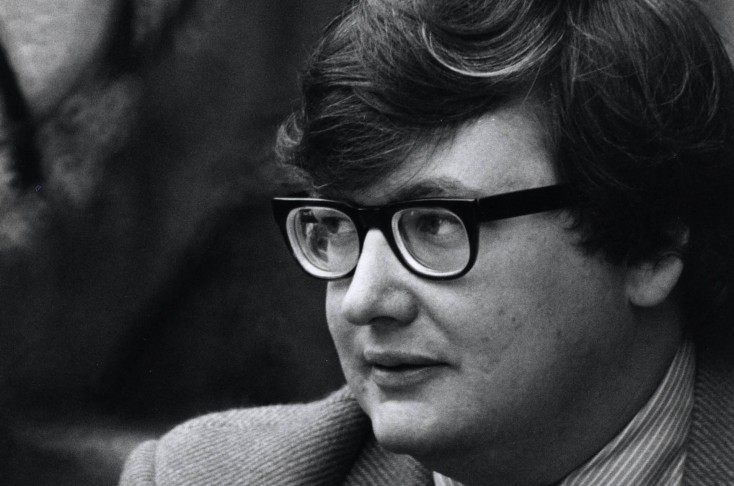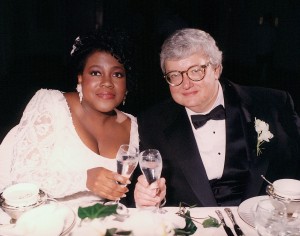By ANGELA DAWSON
Front Row Features
HOLLYWOOD—Former trial attorney Chaz Hammelsmith Ebert enjoyed 20 unforgettable years married to noted film critic Roger Ebert. Inseparable, especially after Roger was stricken with cancer in 2002, their love story would make a beautiful movie. And, indeed, it is just that in the Steve James documentary “Life Itself.” (The title is taken from Ebert’s bestselling memoir.)
The Eberts had originally agreed to do the documentary to show how Roger had persevered after battling cancer, which had taken away part of his face and robbed him of his voice. He went back to work as the film critic of the Chicago Sun-Times, and was able to express his thoughts and ideas through an artificial voice connected to his computer.
“Life Itself” documents the Illinois native’s personal history, as the only child of German immigrants, his long and storied career at the Sun-Times (he was the first film critic ever to win a Pulitzer prize for his work), his love-hate relationship with fellow Chicago critic Gene Siskel, interspersed with images of Roger’s rehabilitation from a hip fracture, coping with the daily painful ritual of getting nourishment through a feeding tube, with Chaz always near his side, conjoling Roger, but never pitying him.
After a valiant fight, the beloved critic, who along with Siskel, made famous the thumbs up-thumbs down designation, succumbed on April 4, 2013 at age 70.
Fourteen months later, “Life Itself,” made by the director of “Hoop Dreams,” is hitting movie screens. Chaz Ebert, an upbeat, tireless woman who is carrying on her husband’s legacy by running (and even expanding) his movie website, rogerebert.com, and other projects, spoke by phone about her husband, the documentary and what’s ahead.
Q: How did this film come to pass?
Ebert: Representatives for Steve James and (producer) Steve Zaillian, (“Schindler’s List,” “Moneyball”) approached us. They told us they were interested in making a movie from Roger’s memoir, “Life Itself.” We thought “Hmm.” Then Martin Scorsese was attached to the project as an executive producer, and we thought, “That’s a great team.” But Roger wanted to know why Steve would want to make a movie about a film critic, and more importantly, how would he do it. So we got Steve in to talk to us. At that time, Roger was, medically speaking, doing very well. The cancer had not recurred, or at least we didn’t know it had recurred. He was still going to movies every day and doing all this stuff so the point is we were going to make a movie about Roger doing all this stuff: giving dinner parties, giving speeches with a synthesized voice, going to film festivals, all of that. But then he fractured his hip and for the next four months, except for two days, he was in the hospital. I’m glad that life didn’t telegraph to us that that was going to happen because then we wouldn’t have this beautiful portrait on the screen.
Q: Were you involved with the editing?
Ebert: No. What I was involved in was opening up our archives, the photos and clips and writing and calling people and telling them this is a project we wanted to see go forward and asking them to be candid and open and honest with Steve as possible.
Q: Many TV shows and movies tend to glamorize cancer. In seeing this film, you get a sense of what it’s like to be there with someone who has it and the day-to-day challenges of what you go through as patient and loved one. Can you watch it without crying?
Ebert: No, I can’t, although sometimes I try to, but it gets me every single time. Even when I try to put some distance between myself and the film, I can’t, because it’s such a beautiful and powerful film, and it’s about a man I love. I thought my husband was extraordinary. This is the man that I love so even though I try, it’s hard. I sit back and try to look at the cinematic elements of it—that I can do, a little bit. But the emotions of it are so overwhelming that they just suck me right in and the person who reads Roger’s words—Stephen Stanton—the voice actor who does Roger’s voice is so good, that each time, I lose myself in it. I’m in a dream state. It feels like I’m hearing from Roger. It’s really hard to be objective about it.
Q: What was your objective on being part of the film?
Ebert: First of all, I thought Roger’s memoir, “Life Itself,” was so interesting and invigorating and showed so many different facets of his life. He talked about film and he talked about other things. He talked about his time in South Africa. He talked about a lot of stuff. So I thought, “Yeah, it actually could be cinematic.” I thought we were going to get a portrait similar to Roger’s memoir, and that it would be something people could see why Roger not only survived as a film critic all these years, but why he thrived and became a cultural icon, and why he became one of the most celebrated critics in the world.
Q: Gene Siskel, the Chicago Tribune critic with whom Roger did the review shows with, was very private about his personal life until he died of brain cancer in 1999 at age 53. But Roger chose to open up about his illness to the world. That epitomizes their different styles, doesn’t it?
Ebert: True. And the film really focuses on that. Even if we didn’t say anything about it, no editorializing about it, you can just see it. It’s there so plainly.
Q: The outtakes of their bickering while make their TV show that are shown in “Life Itself” were great.
Ebert: Yeah, they’re hilarious.
Q: You’ve managed to maintain Roger’s legacy with the website, a Facebook page and more. Was that something you promised him you would continue or was that something you decided to do after his death to honor him?
Ebert: One of the answers is that I became the vice president of the Ebert Company in 1990, so for years I was involved in running the business, but always behind the scenes. People didn’t know me. So part of my job was going to movies and film festivals with Roger and because I had a big interest in movies and the business of it, I would keep up with things. In 2002, when we started Rogerebert.com, Roger and I co-founded that with the Chicago Sun-Times. In 2013, when we were going independent so we could do a whole overhaul of our website, it was just natural for me to keep things going.
Q: Did you get a sense early last year that he was going to die?
Ebert: Before he passed away, I think he knew he was leaving, even though I didn’t. I thought he’d have at least another two or three years. When he gave me in March of last year the secret code to his password and Twitter accounts, he said, “Please, don’t close these accounts. Keep them going. Keep communicating with people.” With the website, he thought he would be around to run it with me. But he said, “If something happens to me, I want you to keep it going, but only if it makes sense for you to do so, but only if you have still have an interest in doing it. Don’t do it just for me.” So, I kept it going, partly for his legacy but also because it was something I liked doing. It was something I’d been doing for a long time. It’s also something I thought was necessary.
Q: How long do you plan to continue it?
Ebert: Right now, I still think it is necessary. Who knows what I’ll need next year. As I advance in the stages of grief and widowhood, I may decide I want to do something different. I just don’t know right now. I’m just taking it a day at a time.
Q: Do you enjoy maintaining that and keeping the spirit of Roger there?
Ebert: I enjoy it so much; it’s why I’m very hands on. I have an editor Matt Zoller Seitz, in New York, and a content editor, Brian Tallerico, in Chicago. But I am truly a hands on publisher. I try to keep an eye on the store and make sure that things move in a different direction because it’s now my vision that is now guiding it and my vision includes part of his vision. I can see where there’s a need for some change, expansion of some things, maybe a reduction of some others. So right now I’m enjoying it immensely.
Q: Will there be more material for “Life Itself” on the DVD?
Ebert: I think so. I have talked to Steve James about it. He said he has so much stuff, he wants to do some enhancements for the DVD or the website. I know there will be a few more things added, but what I’m hoping is that people will go and see this in theaters, because that’s the way Roger wanted it seen. He was a community builder and he wanted people to see it as a community with friends on a big screen. When I see it like that, I see something different each time.






